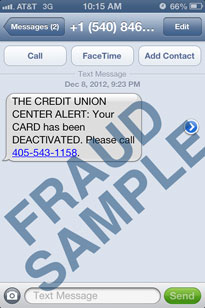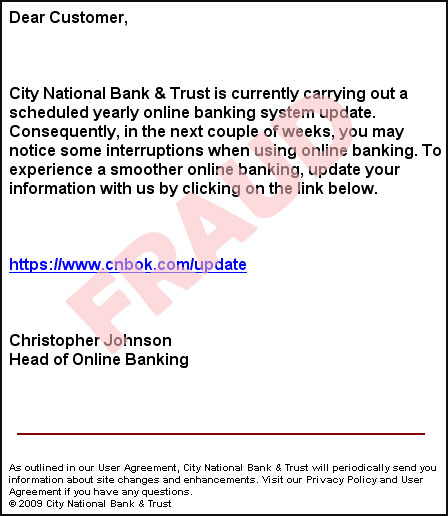Fraud Alerts
Fraud Alerts
For Your Protection, Be Aware of Potential Scams and Fraud
FTC Recommendation:
The Federal Trade Commission (FTC) recommends that you check your credit reports periodically, which can help you spot problems and address them quickly. Suspicious activity or misuse of your personal information should be reported to local law enforcement, your bank, and the FTC who can be contacted at #877-438-4338. Additional information can be found on the FTC website at www.ftc.gov/idtheft.
City National Bank is committed to protecting our customers. Click here to review our rules for customer contact, and note the customer information that our representatives will never ask for. Do not respond to any phone calls, text messages, e-mails, or direct mails that you suspect is not from City National Bank. Report all suspicious contact immediately. To make a report:
- Visit your nearest City National Bank branch
- Call customer service at 1-866-385-3444
- Send an e-mail to report@cnbok.com
Information About Fraud
Be aware of text messaging scams that may be circulating within your community. An example of a suspicious text message is one which the customer is alerted that their card has been deactivated, and they need to call a specified telephone number. At this time, City National Bank would not inform you that your card has been deactivated through a text message.

If you receive this text message or a similar message, do not respond. To verify or report any suspicious text messages, contact us with the contact information provided above immediately.
Be aware of e-mail scams that may also be circulating within your community. The example provided below is an illustration of what a potential fraudulent e-mail might look like.

If you receive any suspicious e-mails, please do not open or reply to them and do not click any links. To verify or report any suspicious e-mails, contact us with the contact information provided above immediately.
Phishing is an electronic scam that attempts to gain access to personal and financial information, such as usernames and passwords, social security numbers, and credit card numbers, by masquerading as a trustworthy sender through electronic communication for the purpose of financial gain.
It is important to not open suspicious emails, click on unverified links, or reply to emails, text messages, or other forms of electronic communication. If you believe you’ve received a suspicious form of communication or have interacted with a suspicious form of communication, please contact City National Bank with the contact information provided above immediately.
Vishing (also called “voice phishing” or “VoIP phishing”) is the voice counterpart to phishing via the telephone to gain access to private, personal, and financial information from an individual for the purpose of financial gain.
Vishing scams can be conducted over the phone with a recording that asks the user to phone an 800 number or through e-mail by asking the recipient to make a telephone call to a specified phone number. The call triggers a voice response system that asks for the user's credit card number.
City National Bank has become aware that a vishing attempt is being made on its customers in which customers are receiving a phone call with a recording that states that the “City National Bank’s Security Department has discovered that their debit cards have been compromised and that they need to contact a 418 number for more information.” If you receive this call, please do not call the number provided.
If you receive any suspicious communication attempts, or if you have called the number provided in a vishing call, please contact City National Bank with the above provided contact information immediately.
